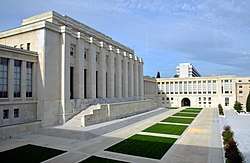International organization
An international organization (intergovernmental organization) is an organization established by a treaty or other instrument governed by international law and possessing its own international legal personality, such as the United Nations, the World Health Organization and NATO.[2][3] International organizations are composed of primarily Member states, but may also include other entities, such as other international organizations. Additionally, entities (including states) may hold observer status.[4]

Notable examples include the United Nations (UN), Organization for Security and Co-operation in Europe (OSCE), Bank for International Settlements (BIS), Council of Europe (COE), International Labour Organization (ILO) and International Police Organization (INTERPOL).[5]
History
The first and oldest intergovernmental organization - being established employing a treaty, and creating a permanent secretariat - is the International Telecommunication Union (founded in 1865). The first general international organization—addressing a variety of issues—was the League of Nations. The United Nations followed this model after World War II.
Purpose
The role of international organizations is helping to set the international agenda, mediating political bargaining, providing a place for political initiatives and acting as catalysts for the coalition- formation. They facilitate cooperation and coordination among member nations.
Regional organizations
International organizations typically have member states from the whole world, however in some cases organizations have geographic limitations, such as the European Union, African Union and NATO. The United Nations also has regional organizations, such as UNECE and UNECA.
The oldest regional organization is the Central Commission for Navigation on the Rhine, created in 1815 by the Congress of Vienna.
United Nations Agencies
The United Nations organizes its work into agencies, such as United Nations Relief Works Agency, which are generally considered as international organizations in their own right.
Additionally, the United Nations has Specialized Agencies which are organizations within the United Nations System, that have their member states (often nearly identical to the UN Member States) and are governed independently by them, examples include International Organizations that predate the UN, such the International Telecommunication Union, and the Universal Postal Union, as well as organizations that were created after the UN such as the World Health Organization (which was made up of regional organizations such as PAHO that predated the UN).
International NGOs
International Organizations are sometimes referred to as Intergovernmental Organizations (IGOs), to clarify the distinction from International nongovernmental organizations (INGOs), which are non-governmental organizations (NGOs) that operate internationally. These include international a non-profit organization such as the World Organization of the Scout Movement, International Committee of the Red Cross, Médecins Sans Frontières, as well as lobby groups that represent the interest of multinational corporations, such as the World Economic Forum.
See also
Further reading
- Barnett, Michael and Finnemore, M. 1999. "The Politics, Power, and Pathologies of International Organizations." International Organization 53: 699-732.
- Barnett, Michael and Finnemore, M. 2004. Rules for the World: International Organizations in Global Politics. Cornell University Press.
- Hurd, Ian. 2018. International Organizations: Politics, Law, Practice. Cambridge University Press.
Notes and references
- (in French) François Modoux, "La Suisse engagera 300 millions pour rénover le Palais des Nations", Le Temps, Friday 28 June 2013, page 9.
- "Articles on the Responsibility of International Organisations". legal.un.org. Retrieved 21 August 2019.
- Bouwhuis, Stephen (1 January 2012). "The International Law Commission's Definition of International Organizations". International Organizations Law Review. 9 (2): 451–465. doi:10.1163/15723747-00902004. ISSN 1572-3747.
- "International Organizations - Research Guide International Law | Peace Palace Library". Retrieved 21 August 2019.
- "Intergovernmental organizations having received a standing invitation to participate as observers in the sessions and the work of the General Assembly and maintaining permanent offices at Headquarters." United Nations Department of Public Information, United Nations Secretariat.
External links
- Headquarters of International Organisation List of International Organisation and their Headquarters
- Procedural history and related documents on the 'Articles on the Responsibility of International Organizations in the Historic Archives of the United Nations Audiovisual Library of International Law
- World News related documents on the World News related documents